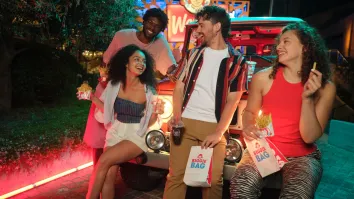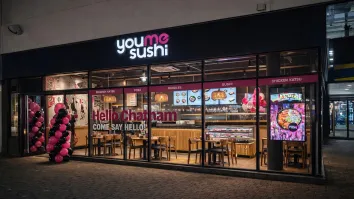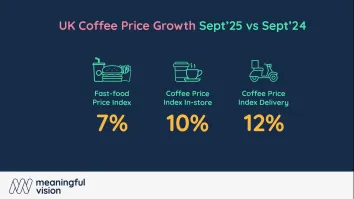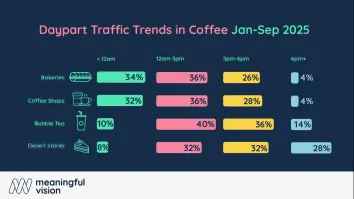The benefits for operators of becoming environmentally friendly
Sarah Munday, head of NPD at Mizkan, discusses how following a more environmentally-friendly approach also benefits the brands that abide by it too.
Sustainability, the need to reduce waste and therefore recycling, is at the forefront of consumers’ minds. Now more than ever before, operators are being forced to rethink their offering to appeal to the waste conscious customer. Environmental awareness has boomed in recent years and is not only now a ‘nice to have’ but actually a way of life for many.
Here are three ways in which an environmentally friendly approach can benefit operators:
Increase brand loyalty
With consumers becoming ever more aware of their actions and the resulting environmental impact, brands that are making an effort to become more sustainable are more likely to build a loyal customer base.
A survey of 5,000 consumers conducted by Iceland revealed that 80% of their customers were in favour of them getting rid of plastic, whilst research from MediaCom found that almost half of consumers (49%) would be willing to pay more for a brand supporting a cause that was important to them.
Seeing large companies acting in a more sustainable and thoughtful manner not only aligns its values with that of the consumer, it also reminds them of the human element behind these organisations - a very powerful message for large corporations to adopt.
While there is currently no legal requirement for companies to be more environmentally friendly in terms of recycling or food wastage, WRAP is a scheme that companies are being encouraged to adopt, in which they pledge to make 100% of the plastic packaging they produce ready for recycling or composting by 2025. Companies already adopting this scheme include Marks and Spencer, Coca-Cola and more recently, Brakes.
With evidence revealing that consumers are far more likely to stay loyal to a brand that is actively doing more for the environment, those cooperating will help to build long term loyalty, as well as a better, more caring brand reputation.
Financial gain - it’s more cost effective than you think
Whilst making packaging changes can be very costly to a business, the longer-term benefits may make it a worthwhile investment for companies to get behind.
In 2016, Unilever revealed that its ‘Sustainable Living’ brand accounted for 60% of the company’s growth in the year – growing more than 50% than the rest of the business. Not only have benefits been through elevated sales, but it also helps to streamline and ease the supply chain. Many food items come with excess packaging which is wasted once the food is consumed.
A prime example of this being fresh fruit and vegetables which come supplied in single-use plastics. These plastics are often discarded after use and many, until recently, could not be recycled at all. Examples of these single use plastics (many of which are being phased out) include sauce sachets, straws and disposable coffee cups – the latter of which is now subject to a fee in many coffee shops.
Given the UK government’s crackdown on these single-use items, we wouldn’t be surprised if these items are completely phased out within the next few years. By ditching the plastic or reducing the amount of packaging available, operators could save a considerable amount on their materials and the production costs associated with this, in addition to driving additional sales through consumer backing.
At Mizkan, we’re actively looking for ways to reduce our carbon footprint and make our products more environmentally friendly. In 2016, we invested over £2m into PET packaging, enabling Branston to offer British-made, PET Table Sauces and making Mizkan the only UK-based private label sauce manufacturer offering PET packaging. We are also now looking into rPET (recycled PET) within our packaging to further encourage environmentally friendly processes.
Reduce waste
Whilst plastic packaging extends the shelf life of food, it doesn’t mean that we actually eat it before its sell by date. In fact, according to a recent report from Friends of the Earth Europe and Zero Waste Europe, almost a quarter of food wasted in the UK is thrown away whilst still wrapped in its plastic packaging. This is largely down to the fact that plastic packaging encourages consumers to purchase more food than they need to – leading to food waste. Food that is available to be purchased alone, is less likely to be wasted.
Grab and go operators should look at selling food unpackaged where possible, not only reducing the amount of packaging required, but also the amount of food that is ultimately wasted. Instead of using cling film to wrap foods, operators should look to use biodegradable greaseproof papers to package food instead. Regular customers should also be encouraged to bring in their own Tupperware or similar to eat from and store food in to help reduce waste.
Another incentive that works well in large coffee shop chains is to encourage consumers to bring in their own reusable coffee cups, instead of using takeaway cups, in exchange for a discount on the price of their coffee. In addition, for those inevitable times where food is left behind, operators should look to donate the left-over food to charity, cutting back waste, and helping a good cause.
It is important to remember that sustainability and environmental friendliness are not changes that will happen overnight, so operators need to be realistic about the timeframes they set themselves. Any change, no matter how small, is one that will eventually help to make a difference. For consumers, it is paramount that they see operators and larger companies actively looking to make this change, and lead by example.
























